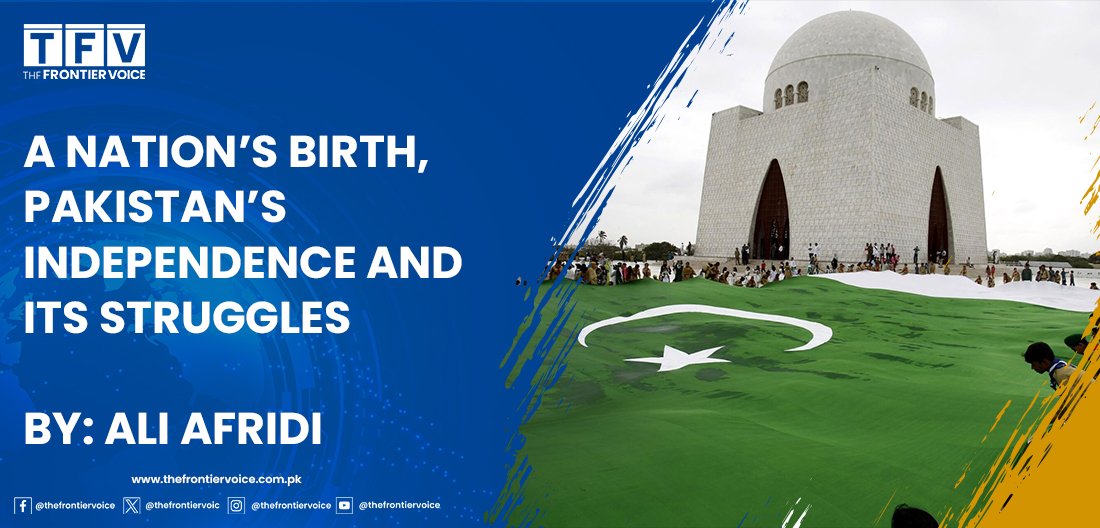POLITICS
A Nation’s Birth, Pakistan’s Independence and Its Struggles

By: Ali Arfidi
A long and tumultuous night ended with the announcement of a name that had been whispered, debated, and longed for: Pakistan. You could feel its arrival it was inevitable. At the stroke of midnight, as the world rested, Hindustan awoke to a new reality: freedom for some, but also the partition of a land that had shared centuries of history. It was a moment that comes rarely in history, one that marked the end of an era and the birth of a nation, where the soul of a people, long suppressed, could finally find its voice. Seventy-seven years ago, the subcontinent was divided in a decision that forever altered its destiny. Despite assurances from leaders of both sides that the transition would be peaceful, the partition unleashed unimaginable violence. What followed was a nightmare: riots, massacres, looting, and mass displacements. Entire families were torn apart. Trains carrying refugees turned into “blood trains,” filled with the lifeless bodies of those who had hoped to start anew. Even nature seemed tainted—fruit on the trees bled red, as if reflecting the chaos around.
Pakistan: A Land Born of Sacrifice
Pakistan was not handed to its people—it was earned through countless sacrifices. Lives, property, and dignity were lost in pursuit of a homeland where Muslims could live freely. Yet, independence was only the beginning of the struggles. The new nation faced severe challenges right from the start: scarce resources, political instability, and conflict. Just a year after independence, Pakistan found itself embroiled in war, despite barely being able to sustain itself. Decades later, in 1971, political unrest and separatist movements led to the loss of its eastern wing, giving birth to Bangladesh. These events left deep scars on the fledgling nation. Accusations of betrayal, assassinations of leaders, and internal divisions created further turmoil. And then came the global age of terror, ushered in by the events of 9/11.
The War on Terror: A Battle for Survival
For many, terrorism is a global issue. For Pakistan, it has been a fight for survival. The post-2001 era saw Pakistan swept into the chaos of the U.S.-Afghanistan war. As a neighbor with historical ties to Afghanistan, Pakistan bore the brunt of this conflict. The influx of millions of Afghan refugees created both humanitarian challenges and opportunities for terrorists to exploit. Terrorist attacks, particularly in Pakistan’s northern and western regions, devastated the nation. Tourism vanished, public infrastructure crumbled, and innocent lives were lost. Around 70,000 civilians have died in terrorist incidents, and the economic toll has been staggering—$126.79 billion over the last two decades. This financial burden has crippled Pakistan, pushing its economy deeper into debt. Despite these challenges, Pakistan has played a crucial role on the global stage. It became a key partner in the United Nations’ anti-terror resolution, adopting strategies to deny terrorists safe spaces, disrupt their financing, and bring affected regions into the national fold.
Pakistan Army: Fighting Terrorism Head-On
The Pakistan Army has been at the forefront of the fight against terrorism. Through decisive operations like Zarb-e-Azb and Khyber I-IV and the current ongoing Azm-e-Istehkam, the military dismantled networks of high-profile terrorists. These efforts were complemented by the government’s National Action Plan (NAP), which focused on eliminating extremism and rebuilding affected communities. The results have been significant. Terrorist attacks and casualties have declined dramatically, with losses reduced by 63%. The improved security has also created opportunities for economic recovery, with growth beginning to take root in various sectors.
Resilience and Renewal
Today, Pakistan stands stronger scarred, but unbroken. It has endured wars, political instability, terrorism, and economic challenges, yet it continues to persevere. The sacrifices of its people and armed forces have ensured its survival. This land, born of struggle and sustained by resilience, sends a powerful message to the world: survival is the firststep toward freedom, and freedom is worth every sacrifice.
